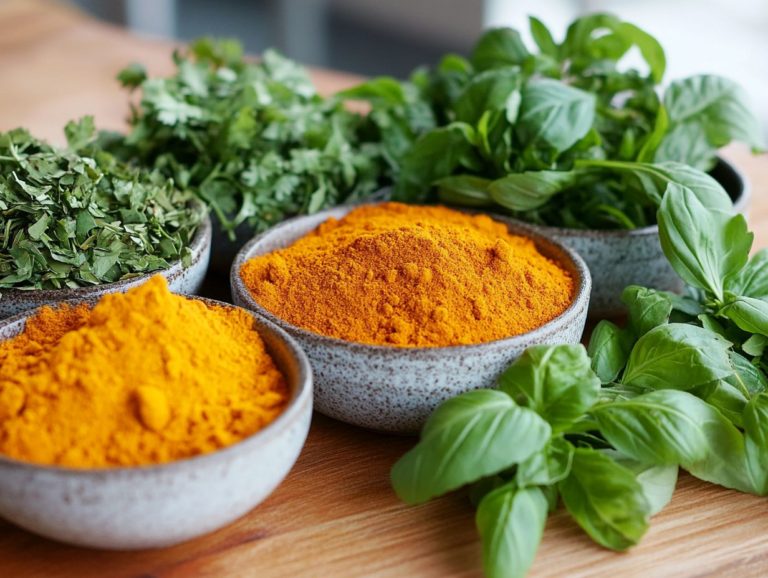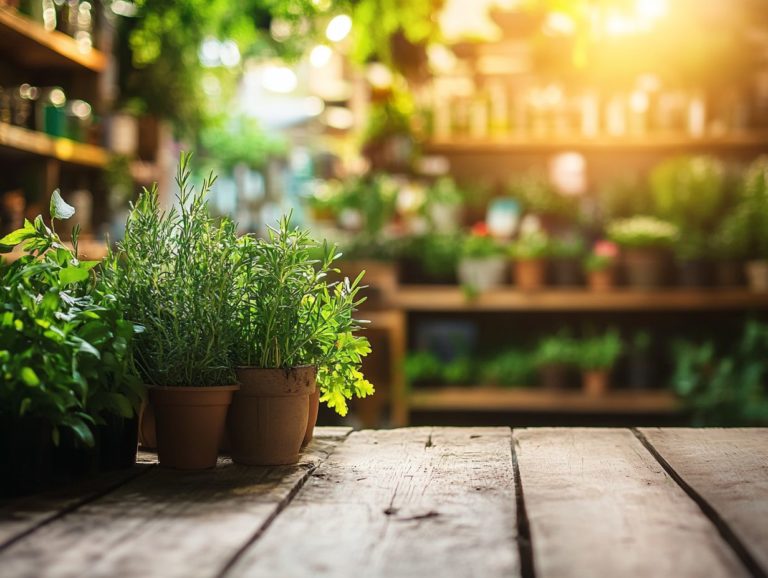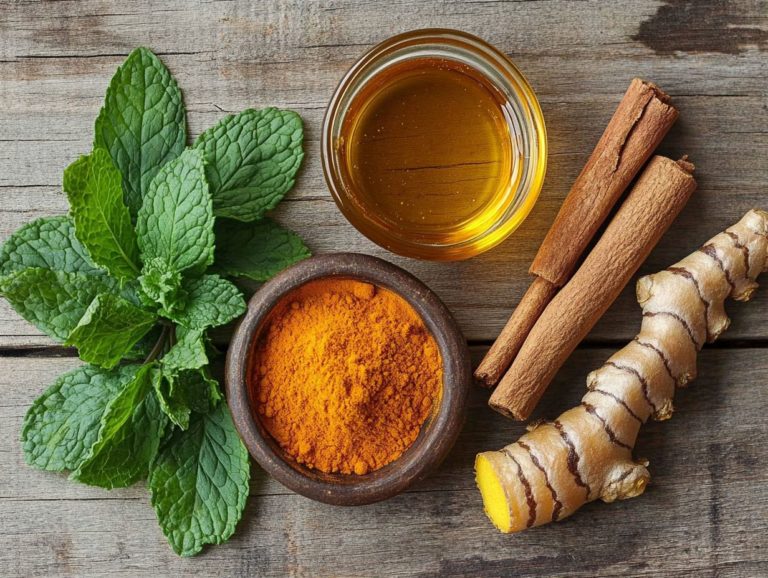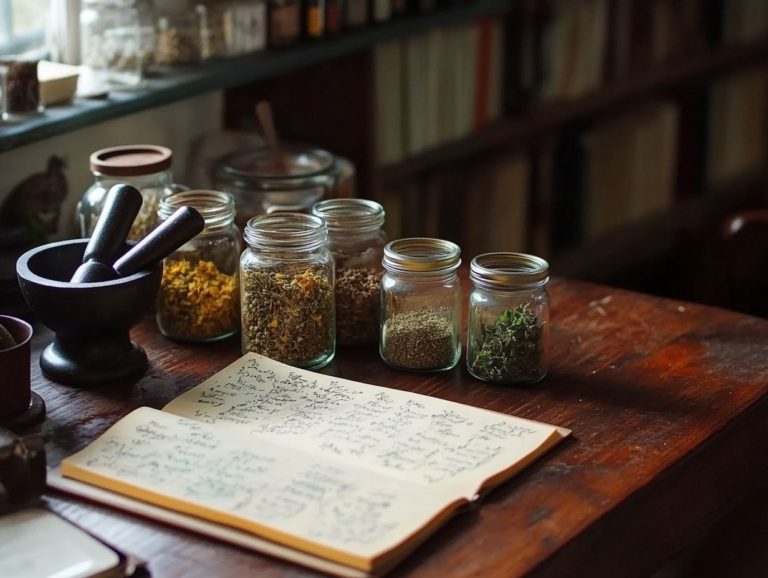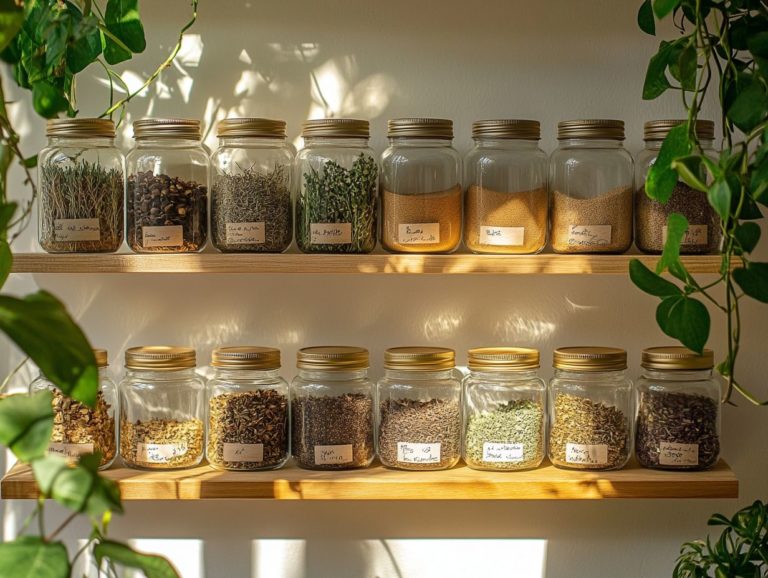What Are the Best Practices for Herbal Remedy Use?
Herbal remedies have been cherished for centuries across diverse cultures. They provide a natural alternative to conventional medicine and showcase the richness of traditional practices.
This exploration delves into the numerous benefits of these old practices. It highlights their healing properties and guides you on how to select the right herbal remedies for your unique health needs. It also addresses important safety concerns, potential side effects, and best practices for dosage, preparation, and storage.
You ll also find practical tips for easily adding herbal remedies to your daily routine, including the integration of dietary supplements for enhanced health benefits. Dive into the amazing benefits of nature s remedies today!
Contents
- Natural Healing Properties
- Choosing the Right Herbal Remedy
- Safety and Side Effects of Herbal Remedies
- Best Practices for Using Herbal Remedies
- Incorporating Herbal Remedies into Your Lifestyle
- Frequently Asked Questions
- Unlock the Best Practices for Using Herbal Remedies!
- What Should I Consider Before Using Herbal Remedies?
- What Is the Recommended Dosage for Herbal Remedies?
- How Should I Store Herbal Remedies?
- Are There Any Potential Side Effects of Using Herbal Remedies?
- Can Herbal Remedies Be Used in Conjunction with Traditional Medicine?
Key Takeaways:
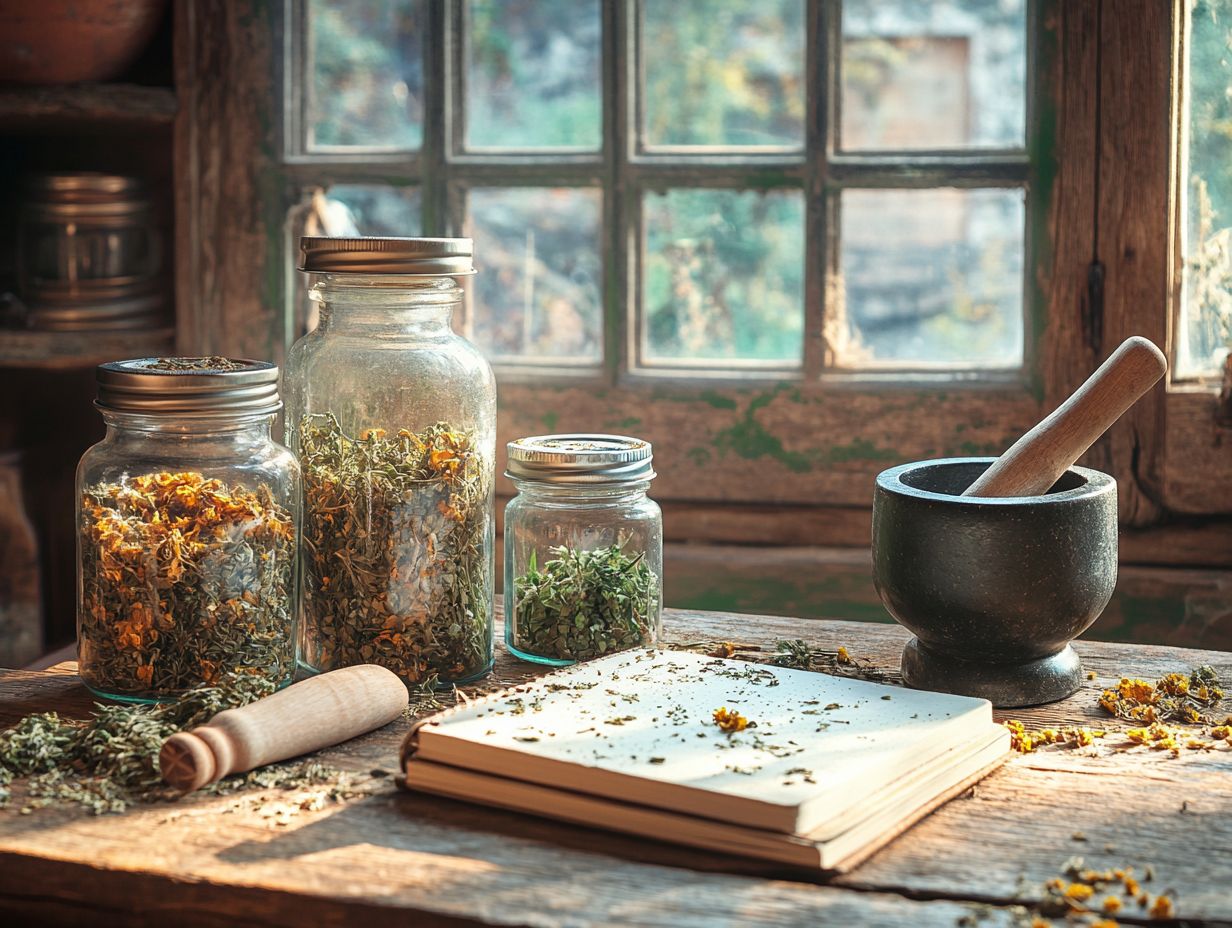
- Before incorporating herbal remedies into your routine, understand their natural healing properties and potential risks, including possible side effects and interactions with conventional medicine.
- When choosing the right herbal remedy, consider factors such as your health condition and any medication you are currently taking.
- To ensure safety and effectiveness, follow best practices such as proper dosage, preparation, and storage of herbal remedies. Incorporate them gradually into your daily routine for maximum benefits.
What are Herbal Remedies?
Herbal remedies are natural treatments derived from plants or plant extracts. They are celebrated for their medicinal properties across diverse cultures, including traditional practices like Native American and Chinese medicine. Examples include Echinacea and Ginseng. For centuries, these remedies have offered a compelling alternative to conventional treatments, promising potential benefits for various health conditions.
With an emphasis on holistic health, herbal remedies often contain active ingredients that enhance their effectiveness. They play a critical role in the world of natural therapies.
These practices spring from the rich cultural wisdom of communities that have turned to nature for healing. Indigenous peoples have long relied on local medicinal plants, recognizing the profound connection between their environment and health. To ensure you are using the best options available, it’s important to understand how to choose quality herbal products.
In traditional practices such as Ayurveda in India and Unani in the Middle East, herbal remedies play a vital role in treating ailments and fostering overall well-being. This ancient wisdom is experiencing a renaissance as more individuals seek alternatives to pharmaceutical solutions, drawn by the allure of natural remedies that nurture the body, mind, and spirit in unison. To ensure safety and effectiveness, it’s important to follow balancing herbal remedies: dosage guidelines.
Benefits of Herbal Remedies
Herbal remedies offer many benefits, including boosting your immune system and providing relief for various health issues. Their effectiveness as natural treatments underscores their integral role in holistic health practices and traditional medicine.
Embracing these remedies can enable you on your journey toward well-being, blending tradition with modern wellness insights.
Natural Healing Properties
The natural healing properties of herbal remedies come from their main parts that help. These ingredients provide health benefits that can significantly enhance your overall health and well-being.
Take Ginkgo biloba, for instance. This celebrated herb is famous for its potential to improve cognitive functions, boost blood circulation, and support mental health. The extract from its leaves is rich in flavonoids natural compounds found in plants that are good for your health and terpenoids, offering protective benefits that may promote brain health.
Next is turmeric, known for its vibrant yellow hue from curcumin. People rave about this compound for its incredible anti-inflammatory and antioxidant benefits, making it a go-to for combating chronic pain and promoting joint health.
Don’t overlook ginger. Packed with gingerol, it has a long-standing reputation for alleviating nausea and boosting your immune system. This makes it a popular choice in herbal medicine.
These remarkable herbs show how nature can play a vital role in supporting your holistic health. However, it’s important to understand what you should know before using herbal remedies.
Choosing the Right Herbal Remedy

When selecting the right herbal remedy, thoughtfully evaluate factors like product quality and safety precautions for your health. Prioritize safety, quality, and recommendations from qualified practitioners to ensure an effective choice.
Making informed decisions can lead to a more rewarding experience with herbal remedies.
Factors to Consider
When choosing herbal remedies, consider essential factors: safety precautions, including potential interactions with medications, and the quality of the product based on industry standards. These elements are crucial for receiving optimal health benefits.
Understanding the active ingredients in these remedies is also important, as they can vary significantly between different brands. Evaluate the efficacy and potential side effects, which can range from mild discomfort to serious health risks.
Be aware that interactions with conventional medications can lead to unintended complications, so a thorough review is essential before introducing any new supplement into your regimen.
Quality assessments are critical in identifying trustworthy products. Herbal remedies can sometimes be contaminated or may have ineffective dosages. Standards from organizations like the FDA and NSF International help maintain the integrity of these treatments.
Therefore, it s essential to follow safe usage guidelines for anyone looking to incorporate herbal solutions into their wellness routine.
Safety and Side Effects of Herbal Remedies
Understanding the safety and potential side effects of herbal remedies, such as St. John s wort and Elderberry, is critical for their effective use in health treatments.
Some remedies may pose risks or interact with other medications, making it vital to approach them with informed caution. For those new to herbal solutions, following herbal preparations dosage tips for beginners can be especially helpful.
Understanding Potential Risks
Understanding the potential risks associated with herbal remedies is essential, as some may lead to adverse side effects or toxic reactions, especially when combined with other medications. For instance, take St. John s wort, which is known for its mood-lifting properties but can interfere with several prescription drugs, including antidepressants and birth control pills, potentially diminishing their effectiveness.
Similarly, Elderberry is frequently praised for its immune-boosting benefits, but it may also cause stomach problems or allergic reactions in some individuals.
To minimize these risks, consulting with healthcare professionals before starting any herbal treatment is crucial, especially if you’re pregnant, nursing, or managing chronic conditions. It’s also wise to conduct your own research on the safety and efficacy of these treatments. For specific guidance, refer to dosage recommendations for popular herbs. Start with a lower dose and keep an eye out for any unexpected reactions to ensure your safety.
Best Practices for Using Herbal Remedies
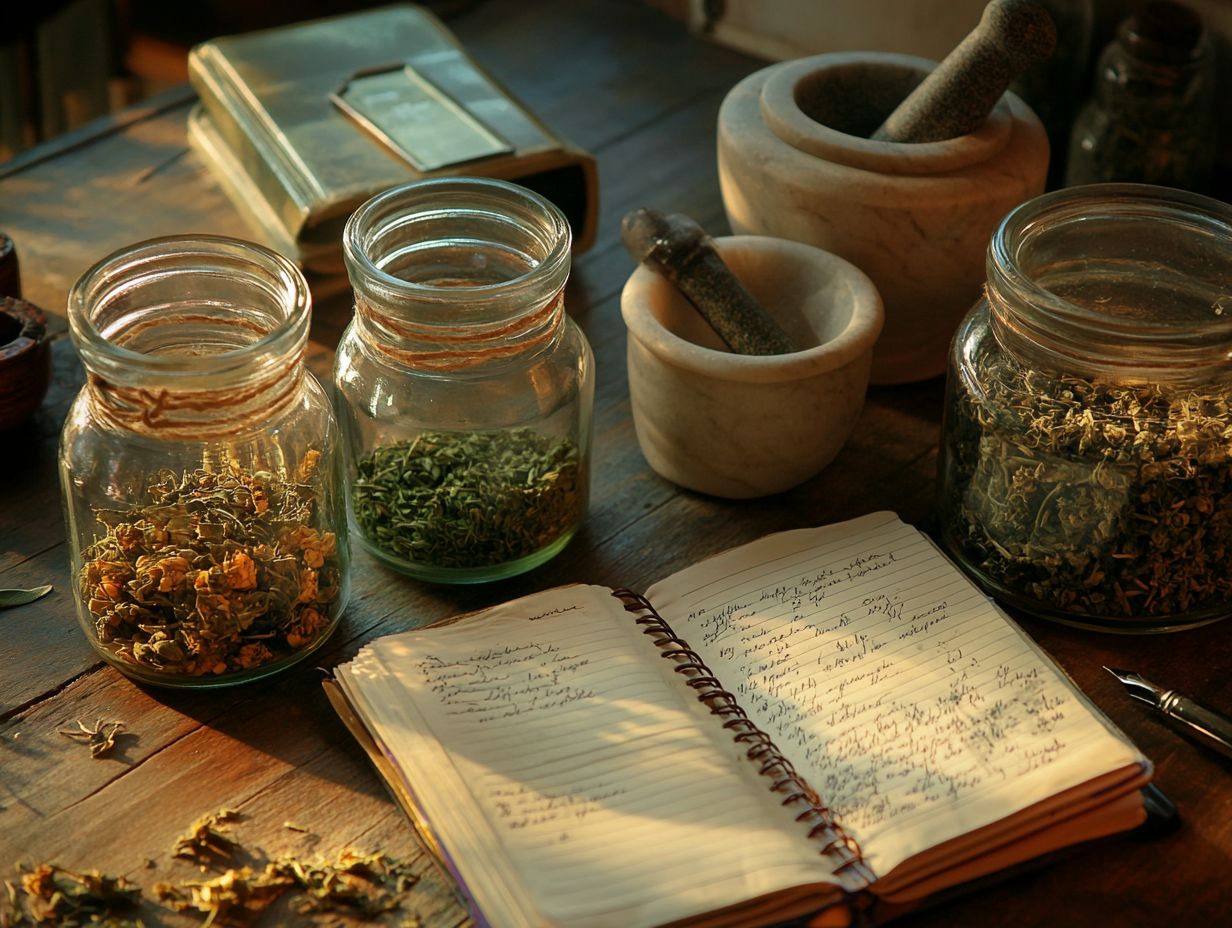
By implementing best practices for herbal remedies, including preparation and dosage guidelines, you can ensure safe and effective outcomes from these natural treatments. This involves paying careful attention to appropriate dosages, utilizing proper preparation methods, and employing correct storage techniques to maintain the quality of your products.
Dosage, Preparation, and Storage
Proper dosage, preparation, and storage of herbal remedies are crucial for maintaining their effectiveness and safety. These factors directly impact the quality of your treatments.
When you approach herbal remedies, understanding the specific guidelines for each action including preparation methods and safe storage practices is essential. For example, the strength of infusions and tinctures can vary significantly based on how you prepare and administer them. By adhering to the recommended dosages, you can ensure that your journey into natural healing is free from adverse effects.
Safe storage practices preserve their therapeutic properties, helping to prevent degradation over time and ensuring their effectiveness for future use.
Collectively, these elements not only enhance your experience but also protect your health, ensuring that the remedies serve their intended purpose effectively.
Incorporating Herbal Remedies into Your Lifestyle
Want to boost your health? Incorporating herbal remedies into your lifestyle can significantly elevate your overall health and wellness, offering a natural approach to health management.
Tips for Incorporating Herbal Remedies into Daily Routine
To seamlessly weave herbal remedies into your daily routine, consider some practical tips that can elevate your wellness game. Incorporate them into your cooking, brew delectable herbal teas such as Chamomile, or take supplements like Turmeric and Ginger regularly for maximum health benefits.
Imagine adding fresh herbs like basil, rosemary, or parsley to your meals; not only do they enhance flavor, but they also boost the nutritional profile and contribute to your overall health. Picture yourself brewing a calming Chamomile tea in the evening; it can be your go-to for relaxation and a restful night’s sleep, making it a favorite among herbal remedies. If you’re curious about their benefits, you might wonder how do herbal remedies work? And when the colder months roll around, sipping on ginger tea can be your secret weapon for supporting your immune system and soothing digestive issues.
For those moments when you might forget your herbal supplements, setting a daily reminder or keeping them in plain sight can be a game changer for consistency. Don t wait! Start incorporating herbal remedies today for better health!
By embracing these simple practices, you can unlock the full potential of herbal remedies and revel in their myriad health benefits, all without feeling overwhelmed.
Frequently Asked Questions
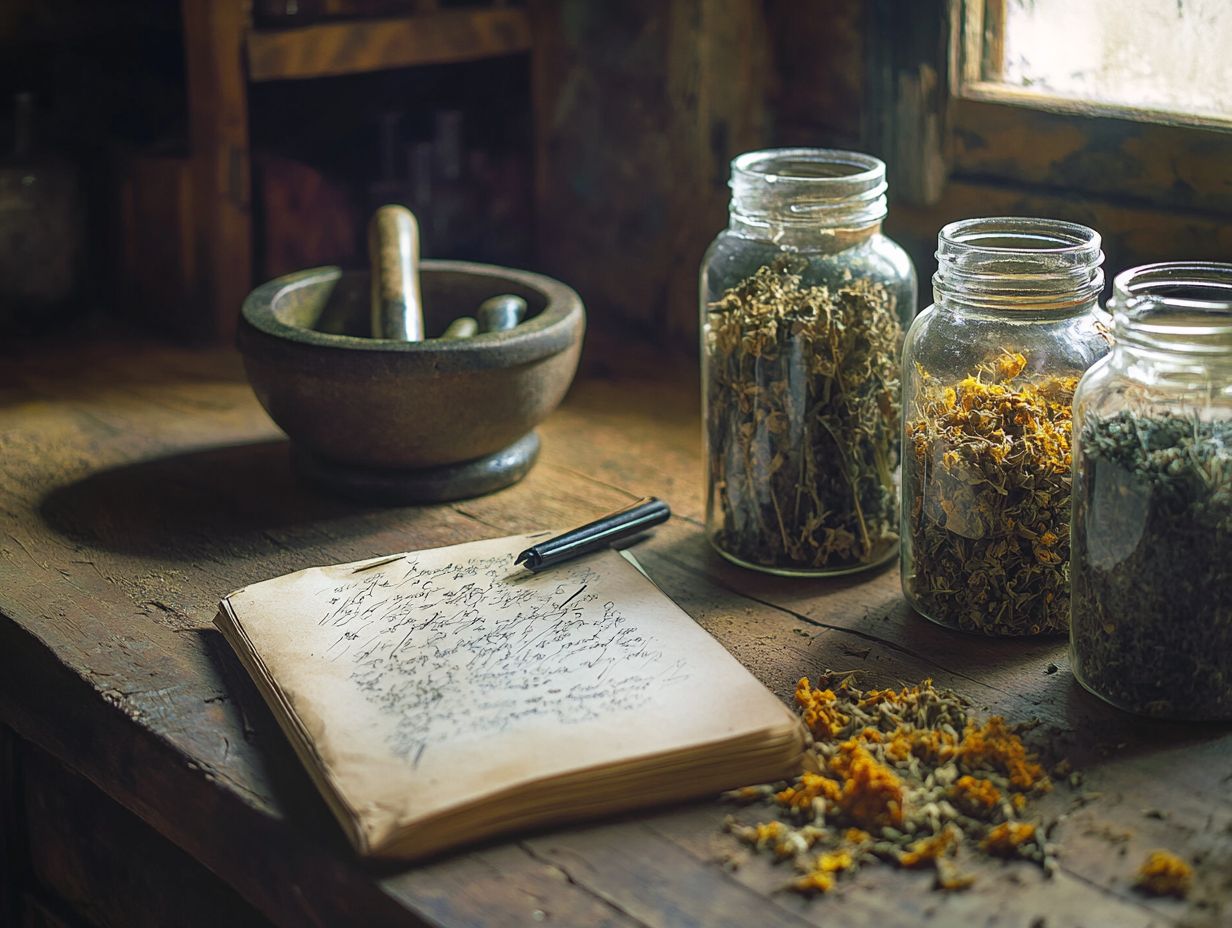
Unlock the Best Practices for Using Herbal Remedies!
Herbal remedies have been used for centuries to promote health and wellness. Use them responsibly to ensure safety and effectiveness.
What Should I Consider Before Using Herbal Remedies?
Always consult with a healthcare professional before using herbal remedies, especially if you have health conditions or take medications. Your safety comes first!
What Is the Recommended Dosage for Herbal Remedies?
The dosage for herbal remedies can vary based on the specific herb and its intended use. Follow the recommended dosage on the product label or as advised by a healthcare professional.
How Should I Store Herbal Remedies?
To maintain the potency and quality of herbal remedies, store them in a cool, dry place away from direct sunlight. Keep them out of reach of children and pets.
Are There Any Potential Side Effects of Using Herbal Remedies?
While herbal remedies are generally considered safe, there is still a risk of potential side effects, especially if used in high doses or combined with other medications. Monitor for any adverse reactions and consult with a healthcare professional if necessary.
Can Herbal Remedies Be Used in Conjunction with Traditional Medicine?
Yes! Herbal remedies can complement traditional medicine as part of a holistic health approach. Always communicate with your healthcare provider about any herbal remedies you are using to avoid potential interactions.


